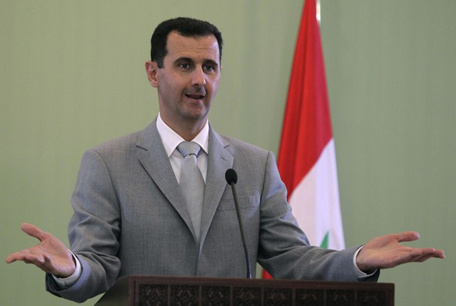Syrian Reform-Too Little, Too Late

 IRD: Even after reforms and the revoking of the emergency law, protests continue in Syria. Why did Bashar Assad continue suppression despite promises of reform? And why did the protests continue despite the revoking of the emergency law?
IRD: Even after reforms and the revoking of the emergency law, protests continue in Syria. Why did Bashar Assad continue suppression despite promises of reform? And why did the protests continue despite the revoking of the emergency law?SZ: The promises of reform would have been influential and accepted by the protesters if they were acted upon immediately. And instead of accusing the protesters, if they had been involved in negotiations real reform could have taken place, therefore directing the crisis to a different path. But the promise of reform- which was on Bashar Assad’s mind for years- was not realized.
The lack of any realization of reform, whether due to those surrounding Bashar Assad, or the population of Syria, or a lack of integrity among protesters, would have had ni effect on the results. The truth is that no reform took place, and that’s why we witnessed protesters expanding their movement, and the uprisings spreading to more cities-- even the coastal cities, which have a different population demographic got involved.
IRD: Despite Bashar Assad’s initial action in dissolving the cabinet and forming a new one, some media raised the issues of internal conflicts and an insecure government. Could this insecurity cause some changes in the political equations of Syria?
SZ: Currently there are a few scenarios existing in Syria. First, events could continue as they did in Egypt, leading to military rule, which would prepare the ground for the formation of a non-military or a coalition (military and civilian) government. Second, it is possible that the Syrian intelligence services and the government chose the option of showing the iron fist. Third, the educated class, who are not part of any party, the government, or the army, and have no specific associations, will continue their scattered protests.
But the reaction of government in deploying tanks or military equipment will fuel the flames of these protests and increase the people’s courage in showing up in the streets.
IRD: The Friday protest in Syria was held in response to an invitation by the Muslim Brotherhood. How do you see the role of the Muslim Brotherhood in organizing and managing the protests? Do they actually have a major influence on the Syrian people?
SZ: Even though the history of the Brotherhood in Syria goes back to 60-70 years ago, they are not as united as their counterparts in Egypt, and they also have less credibility compared to the Egyptian Muslim Brotherhood. They have also performed more radical actions, unlike the Egyptians who avoided radical and violent actions resulting in an expansion of their popular social base. The Syrian brotherhood lacks such a base.
There are Brotherhood bases in some Syrian provinces, but their leaders mainly live abroad and have conflicts among themselves.
What we are witnessing now is a trend that is comprised of educated youth in different countries. The Muslim Brotherhood might have some common slogans with the young Syrians, but it is not clear if they will ultimately share the same demands.
Perhaps currently their demands focus on reforming the political regime, but they might want a regime change in their next step. With these demands, the situation in Syria only gets more complicated and no clear or rapid solution will be reached.
Of course the US is fully using its capabilities in this issue, and some oil- rich Arab countries are also trying to spread the protests by providing the protesters with more facilities. However, we saw that the US was not even able to pass one resolution against Syria in the Security Council.
IRD: It is said that the Salafis are triggering tribes to stand against Assad and they are close to the Ben Soltan faction as well. What role do the Salafis have in the Syrian developments? Are their actions viewed in the same framework as Arab countries against Syria?
SZ: Yes, the role of the Salafis is related to Arab countries to some extent. But it seems that the Salafis do not have high credibility in Syria. They are opposed by the Syrian people, and do not have a good reputation among the Syrian public.
What is common in Syria is a Sufism trend, which has multiple streams and is not after major reforms in the regime either.
However, the Salafis seek power, use violence, and try to destroy religious centers that are respected by the rest of the Muslims. The Salafis even destroy Christian religious symbols as well. Therefore, it doesn’t seem like the Ben Soltan faction will chose them to oppose Bashar. They can cause trouble for Syria through their relations with tribes in border areas- especially near Iraq and Jordan- but they cannot have such influence on the rest of the Syrian tribes.
IRD: Considering all these issues, where do you think Syria is headed? Will Bashar Assad face the same fate as other Arab rulers?
SZ: It seems more probable that the Syrian army- respected by the Syrian people- will have a bolder role and will manage the events with a coalition of party forces and the army.

